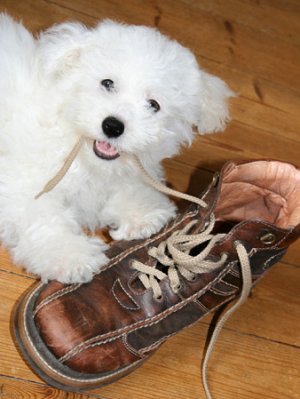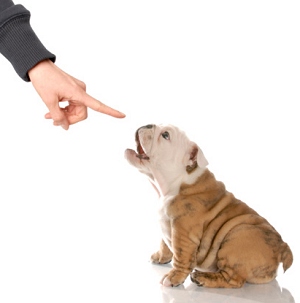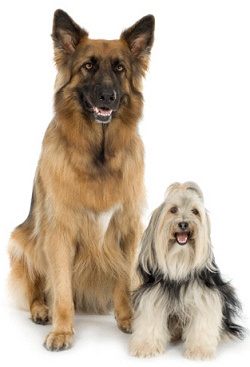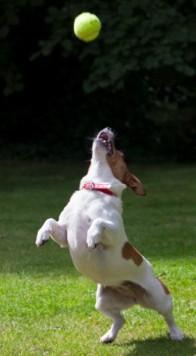Solving Dog Behavior Problems – Dog Training That Works
By Michele Welton, Dog Trainer, Breed Selection Consultant, Author of 15 Dog Books

All puppies (and adult dogs, too) do some things you would rather they not do!
So you're reading this page because your dog is doing something you don't like – some behavior you want him to do differently – or simply stop doing.
- Housebreaking "accidents"
- Barks too much
- Won't let go of things
- Steals food when you turn your back
- Jumps on people
- Chews on your hands
- Constantly seeks attention
- Guards his food or toys
- Pulls on the leash
- Aggressive toward people or other dogs
- Struggles when you try to restrain him
- Chases the cat
- Chews on the furniture or your belongings
- Did I mention housebreaking "accidents"?

The "magic word" for virtually all dog behavior problems is "No." But what you do AFTER you say "No" is the true solution for stopping dog behavior problems. Do you know what to do next?
"How can I stop my dog from....?"
One of the most common questions dog owners ask me is: "How can I stop my dog from (doing some specific behavior problem)?"
![]() They're hoping I'll tell them where to find a secret button on the back of their dog's head that will trigger a misbehavior-OFF switch.
They're hoping I'll tell them where to find a secret button on the back of their dog's head that will trigger a misbehavior-OFF switch.
Alas, my answer is almost always the same, no matter what the misbehavior is. Here it is (free of charge):
You need to tell your dog, "No. Stop that."
Does that sound too simplistic? It probably does, because most owners respond in a frustrated voice, "But I already tell my dog No! He still doesn't listen!"
Fair enough. Here is what is going on. Either he really doesn't understand what No means (this is the truth in MANY cases), or else he understands it but doesn't see any reason why he should obey it.
There are two key points here, you see...your dog must understand the word (I can show you how to teach words properly) and then he must respect you enough to obey it.
Because without respect, your dog may UNDERSTAND what you say, but he doesn't see any reason why he should DO what you say. (Unless you're bribing him with a cookie, which only works sometimes – usually NOT when you need it most.

No matter how large or how small, all dogs need to respect their owners. I teach my small dogs to respect me in the exact same ways I taught my German Shepherds.
Getting your dog to respect you means interacting with him in specific ways that encourage respect.
You might be thinking, "But I already know how to interact with my dog. I care for him and I love him.... it's easy."
Actually, it isn't so easy, because canines see and interpret the world differently than we do.
Whenever you do anything with your dog, even just walking through the kitchen, or petting him, or speaking to him.... he is busy judging your tone of voice, your facial expression, your body language, how you're touching him, how you're responding when he does "X" or "Y".
All of these seemingly little things are very, very important to your dog. They're the clues he uses to draw conclusions about you and to decide whether you're worthy of respect or not.
- If you interact with your dog in certain ways that are WRONG for canines, he will conclude that even though he loves you, he doesn't need to obey you. And you will see behavior problems.
- If you interact with your dog in all the alt ways, he will conclude that he not only loves you, but also that you're a capable leader worthy of respect. Then he will obey when you say, "No. Stop that." (assuming, of course, that you have taught him what it means so that he understands)
Respectful dogs don't misbehave.
It is as simple as that.
Well, okay....ALMOST as simple as that. There are a few more things your dog needs in order to be well-behaved.

Dogs need enough exercise and active play sessions to tire them out. Some dogs need only moderate exercise, while others need LOTS to make them feel content. You must meet the needs of your particular dog.
Exercise, Activities, Companionship
Even respectful dogs will misbehave if they don't get enough exercise, interesting activities to do, and daily companionship.
Dogs are sociable creatures.
- If you leave your dog home alone for 8 hours, he will feel bored and frustrated.
- If you leave him outside for hours at a time, he will feel bored and frustrated.
- If you don't provide enough exercise and activities, he will feel bored and frustrated.
Boredom and frustration are major causes of behavior problems in dogs.
Dogs vent boredom and frustration by destroying things.... digging holes.... rambunctiousness.... escaping.... barking...
Those "misbehaviors" cannot be solved by training. Your dog has every right to vent his boredom and frustration when his needs of Exercise and Companionship are not being met.
You must meet those needs while ALSO teaching commands and a respectful attitude. That's how you raise a well-behaved and contented dog.
What you should do right now to prevent or stop behavior problems
You need to learn the right ways to interact with your dog – and the wrong ways too, so you don't do those!
You need to know how to teach the Magic Word ("No") to your dog and how to respond if he doesn't obey it.
That's how you stop behavior problems. With that one word.... plus respect... plus however much exercise and companionship it takes to keep your dog satisfied.
I can guide you with my complete training program, which is available free on my website. Scroll down to read it!
My best-selling books – now available FREE on my website
 Respect Training For Puppies: 30 seconds to a calm, polite, well-behaved puppy is for puppies 2 to 18 months old. Your puppy will learn the 21 skills that all family dogs need to know. Click here to read for free.
Respect Training For Puppies: 30 seconds to a calm, polite, well-behaved puppy is for puppies 2 to 18 months old. Your puppy will learn the 21 skills that all family dogs need to know. Click here to read for free. Teach Your Dog 100 English Words is a unique Vocabulary and Respect Training Program that will teach your adult dog to listen to you and do what you say. Click here to read for free.
Teach Your Dog 100 English Words is a unique Vocabulary and Respect Training Program that will teach your adult dog to listen to you and do what you say. Click here to read for free. 11 Things You Must Do Right To Keep Your Dog Healthy and Happy helps your dog live a longer, healthier life. Get my honest advice about all 11 Things before you bring home your new puppy, because some mistakes with early health care cannot be undone. Click here to read for free.
11 Things You Must Do Right To Keep Your Dog Healthy and Happy helps your dog live a longer, healthier life. Get my honest advice about all 11 Things before you bring home your new puppy, because some mistakes with early health care cannot be undone. Click here to read for free.
